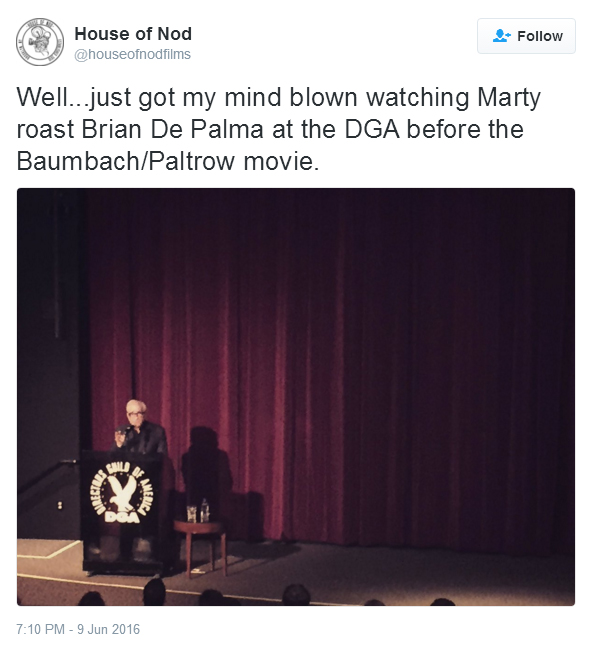INCLUDING CLIP FROM THE FILM; DE PALMA ORIGINALLY WANTED DON JOHNSON FOR NESS
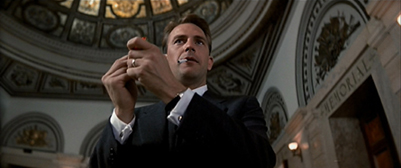 Exclusive Clip from De Palma at Entertainment Weekly
Exclusive Clip from De Palma at Entertainment WeeklyThe Village Voice:
"The Untouchables: In Praise of the De Palma Films That Still Divide Critics and Audiences"
Alan Scherstuhl on Mission to Mars (2000)Let's not oversell this: The critics who lambasted De Palma and Disney's big-budget turn-of-the-century astronaut epic had themselves an easy target. The script is weak, the characters flat, the first ten minutes a stiff bore, and the last twenty or so a palate-offending stew of 2001's beyond-the-infinite mysteries and Close Encounters' humans-meet-aliens playdate — with the origins of life on Earth explained in something like a multimedia planetarium show. But in between, De Palma romps, as clever and geeky as that inventor kid Keith Gordon played in Dressed to Kill, building complex new dazzlements from pieces in Kubrick's toybox: elegantly rotating spacecraft, misadventures outside the airlock, hyper-competent astronauts casually comfortable in zero-g.
De Palma's "stick jockeys" — their term — are underwritten, but they have soul, especially the married couple played by Tim Robbins and Connie Nielsen, even if their idea of romantic accompaniment for a dizzying floating couple's dance is Van Halen. The camera (Stephen H. Burum served as d.p.) glides through three dimensions, in and out of the ships, with a fluidity we wouldn't see again until Gravity. The suspenseful problem-solving set pieces, meanwhile, are expertly shaped and -paced, building to a big-name death that also anticipates Alfonso Cuarón's 2013 Oscar winner. For a movie accused of being derivative, Mission to Mars is in the DNA of a crop of auteurist descendants, including The Martian and Interstellar. And De Palma, wittily, enlivens material that would seem tired in those: He uses the lag-time in interplanetary communication as an excuse to cut in cheery footage of characters who are actually in terrible danger, and the inevitable scene of space travelers watching recordings of people back home becomes one of the director's subtlest screen-splitting lulus.
Vulture, Kevin Lincoln talks w/Baumbach & Paltrow
One of Brian’s comments in the movie that struck me was his remark about Hitchcock, about how Hitchcock’s technique of returning to and reusing visual tropes was sort of dying with him, and how Brian saw himself in that tradition. As good filmmakers in your own rights, what did you guys think about that statement?Paltrow:
That’s our big takeaway from the movie as well, and it’s something that I don’t think we discovered until the editing of the film was finished. Brian sees this visual language, this visual storytelling that starts with Hitchcock. Naysayers claim it’s appropriation, but it’s not. If you look at it like a language or a dialect, it becomes a really compelling way of looking at Brian’s movies, because he’s doing it consistently. People have made movies that we think of as Hitchcockian, which means you make one or two things in that vein, a Body Heat, or a … the one with Sharon Stone and Michael Douglas —
Baumbach: Basic Instinct.
Paltrow: — these movies that are overtly Hitchcockian, but then that person will go on and make something totally different and not necessarily visually driven. But Brian is working in this language that he’s talking about, and we both thought that was a very exciting thing. It’s a very bold observation to make about yourself, but it’s so true, and it changes the way you think of Brian. It’s the ultimate definition for me.
Baumbach: Right, and it’s also been leveled against him, especially throughout his early career, as a negative. But Brian has no trouble owning it.
Do you think that his focus on a visual language rather than plot or scale is one of the reasons why he might have less mainstream name-brand recognition than some of his contemporaries from the ’70s, like Steven Spielberg or George Lucas?
Paltrow: I think a lot of peoples’ experiences with Brian is, I didn’t realize he made this, or he made that. It’s a very strong flavor that’s out there that people know — they just have to be nudged a little bit. And obviously, the people who like Brian and his movies tend to do so fervently.
Teo Bugbee, MTV:
FROM CARRIE TO MISSION: IMPOSSIBLE: A BEGINNER’S GUIDE TO BRIAN DE PALMA
BEFORE YOU GO SEE DE PALMA, THE NEW DOCUMENTARY ABOUT THE DIRECTOR'S LIFE, HERE ARE A FEW THINGS TO KNOW
After a lifetime spent peering out from behind the camera, veteran filmmaker Brian De Palma becomes the subject of his own movie in De Palma, a documentary on his career made by Noah Baumbach and Jake Paltrow. In the film, released last Saturday, De Palma takes his disciples on a guided tour through his filmography, and with them the anonymous audiences and potential filmmakers who have been watching and learning from his movies for decades. If you’re already a De Palma connoisseur, then by all means ignore me and head straight to theaters for your dose of film history. But for anyone who hasn’t yet become acquainted with De Palma’s movies, the documentary presents an occasion to dive into one of Hollywood’s weirdest and most accomplished artists.
De Palma is a perfectionist when it comes to his work, and his obsession with film history and techniques can make understanding his movies a little daunting. He is also, god bless him, a total perv, and while his tendency toward a kind of ironic horniness only makes his movies more endearing as you watch them, I can see how it might be disorienting if the first film you see unexpectedly features an oft-nude woman murdered by a gigantic, phallic power drill. As a fan who stumbled her way into Brian De Palma appreciation without a road map, here are my humble suggestions for anyone who is ready to take the plunge for the first time.
The Black Dahlia Years
The most important advice I can give you as you start your adventures with De Palma is to avoid being born in the early ’90s, which dooms you to the youthful error of picking up the first new De Palma movie you see at your local video store. Fortunately, there are no video stores anymore, but the point is that if you’re like me, this path leads to watching The Black Dahlia at 13 — long before your developing mind can wrap itself around any coherent sense of irony, surreality, or forgiveness — and then vowing never to watch a De Palma movie again. I came around eventually, but The Black Dahlia is a movie that is For Fans Only if there ever was one; with a plot that never stops unfolding, the only actor who seems to even have a clue what’s going on is Fiona Shaw, who adjusts to the mess around her by going completely bonkers. Critics and 13-year-olds declared it incoherent at the time, and while De Palma stans might find camp value in the movie’s never-ending twists, nonsensical lesbianism, and A-list bad acting, first-time De Palma viewers would be better off starting with a movie that offers more straightforward pleasures. The same word of caution applies to Passion, the glossy corporate thriller De Palma made a couple years ago with Rachel McAdams, which is mostly good, utilizing Skype as a 21st-century cinematic device several years before Unfriended — but which is also unfortunately hampered by a deranged (and not in a Fiona Shaw–esque, good way) performance by the Swedish Dahlia, Noomi Rapace. As a rule, recency is not the best path into De Palma, and if you can sidestep the hurdle of starting out with movies that might be older than you are, you’re already over the biggest challenge.Carrie
If you want to get on board with a documentary in which a grandpa talks about nothing but his own movies for two hours, I’m going to send you back to 1976 to watch the horror classic Carrie. Carrie is, truthfully, a bit of an anomaly among De Palma’s films — while he has dabbled in just about every genre, De Palma’s preferred filmmaking style tends toward mysteries and thrillers like his hero, Alfred Hitchcock. The themes of the occult that make the explosion of violence in Carrie so mesmerizing don’t really recur anywhere else in De Palma’s decidedly secular cinema. But what Carrie does highlight for first-timers is the pinpoint precision of De Palma’s formal style, his queasy ability to express unstable mental states through sound and image — think of the kaleidoscopes and split screens that accompany the start of Carrie’s attack on her high school prom — and the thin balance between sincerity and insincerity. Stephen King’s source material and Sissy Spacek’s performance ground the film in the relatable outsider’s perspective, but De Palma unsettles any sense of normal identification, pushing scenes like Carrie’s endurance of her mother’s religious ecstasies to melodramatic extremes. In De Palma’s hands, part of the film’s horror comes from not being sure if you should be laughing, crying, or screaming at the unfolding tragedy of Carrie White.Sisters and Carlito’s Way
Where to go after Carrie is a little tricky, because Carrie is so good that if you start looking for Carrie equivalents you’re just going to come back disappointed. Sisters is a solid early De Palma outing focused on an actress who either has an evil twin or a killer case of multiple personality disorder. It hews closer to De Palma’s usual external preoccupations like murder and doubles without burrowing to the same emotional depths as the more psychologically introspective Carrie. The Untouchables is famous, but it’s also straight-up bad — its constant winks to classic films and Al Capone might constitute kitsch if only it weren’t following such a bland team of lawmen. Skip it until you’re so invested in De Palma movies that even a De Palma movie starring Kevin Costner can’t bore you to an Eisenstein-homage-themed hell. On the other hand, Carlito’s Way marries De Palma’s ostentatious style with a thoughtful story examining cycles of crime and recidivism — but it’s kind of a dad movie. Either watch with your dad or become a dad and then watch it.
THAT IS SOOOOO MTV!




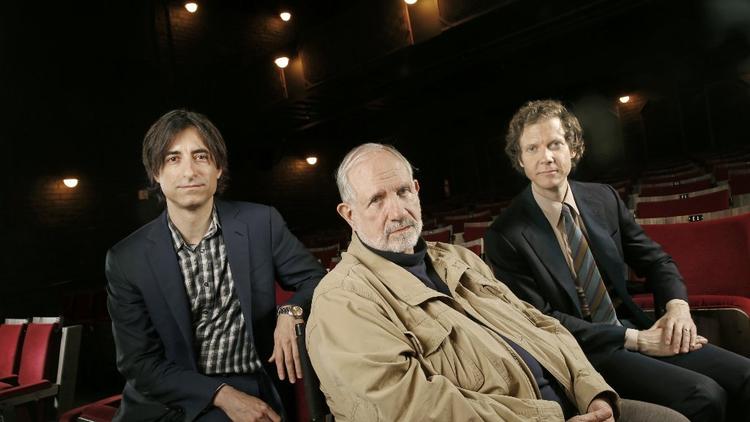
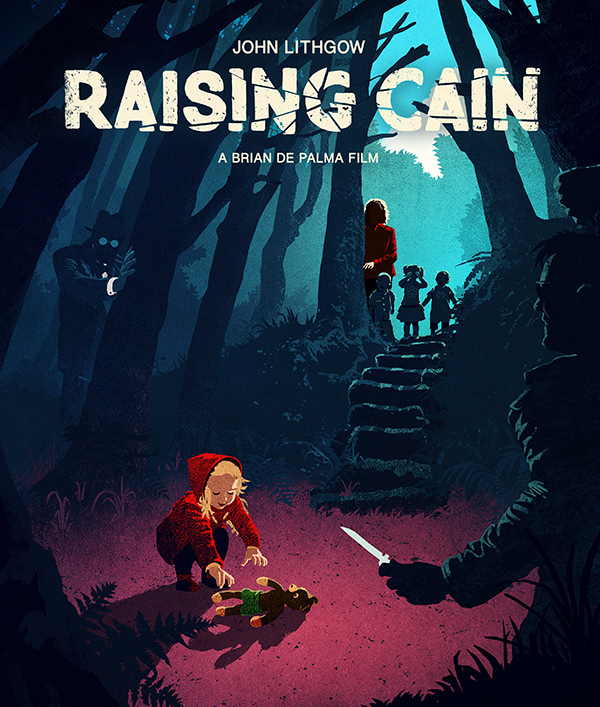
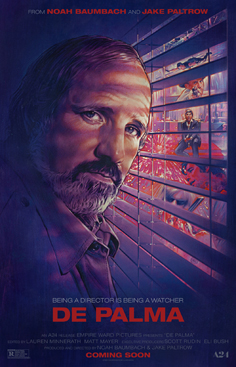
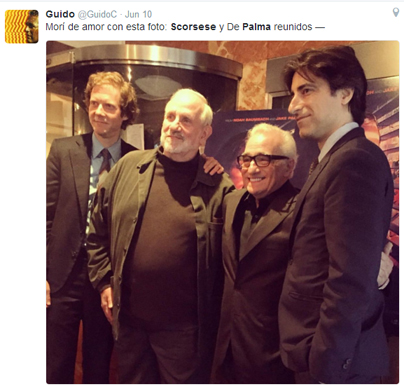
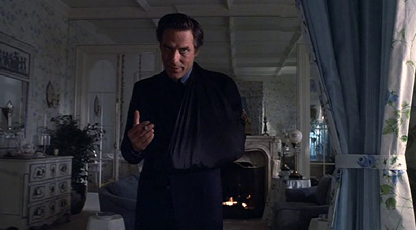 Not to present a sort of "point/counterpoint," but the articles about the new documentary De Palma by
Not to present a sort of "point/counterpoint," but the articles about the new documentary De Palma by 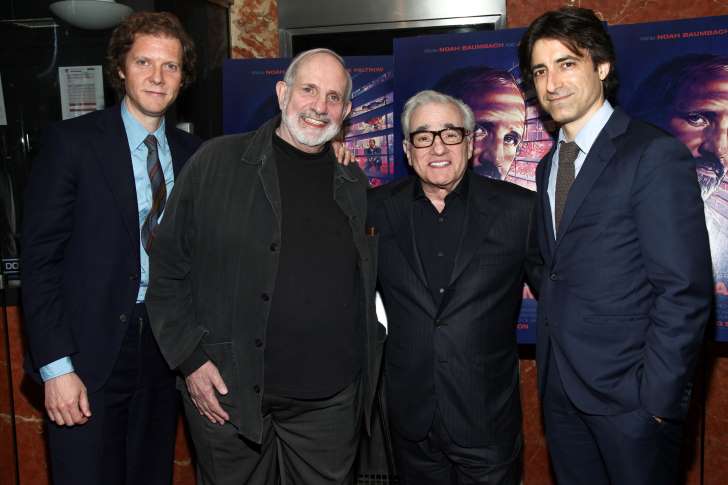
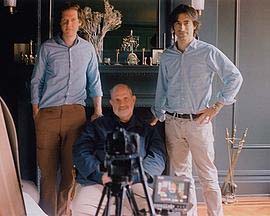 Go to
Go to 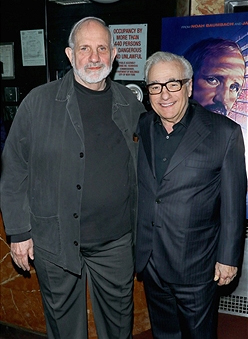 Martin Scorsese introduced a screening of De Palma last night at the DGA Theater in New York City. According to a tweet from
Martin Scorsese introduced a screening of De Palma last night at the DGA Theater in New York City. According to a tweet from 